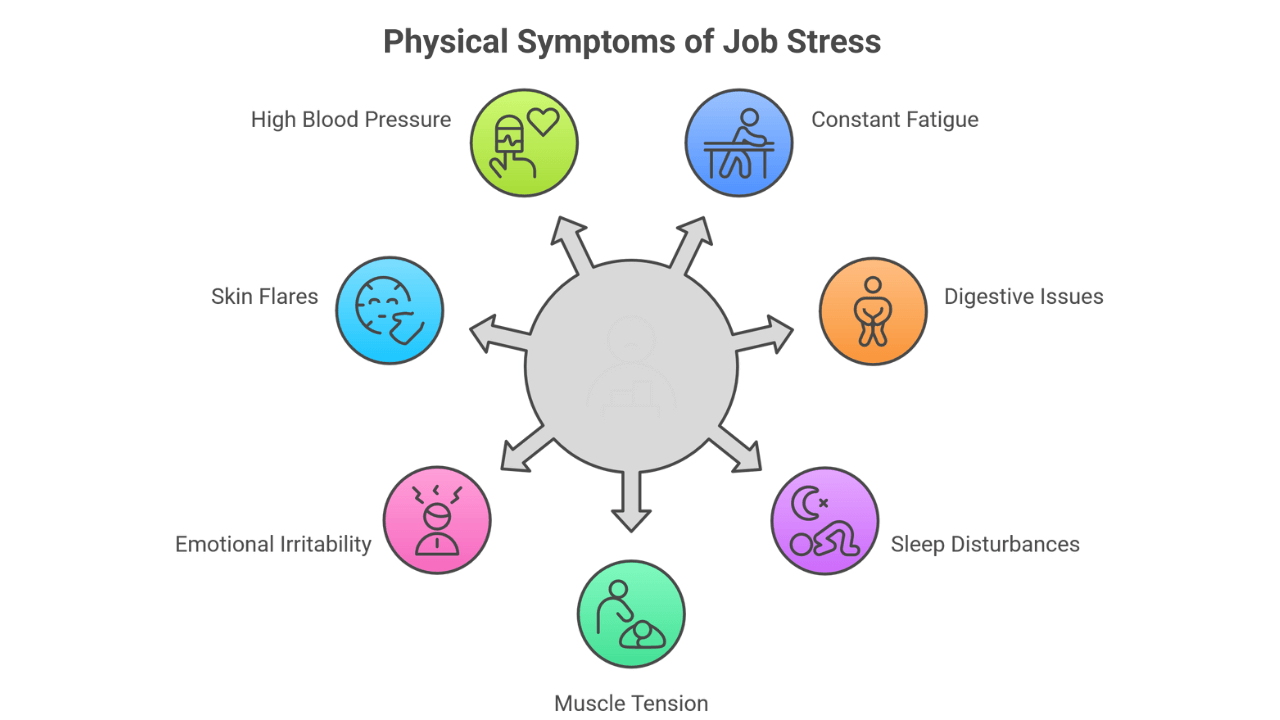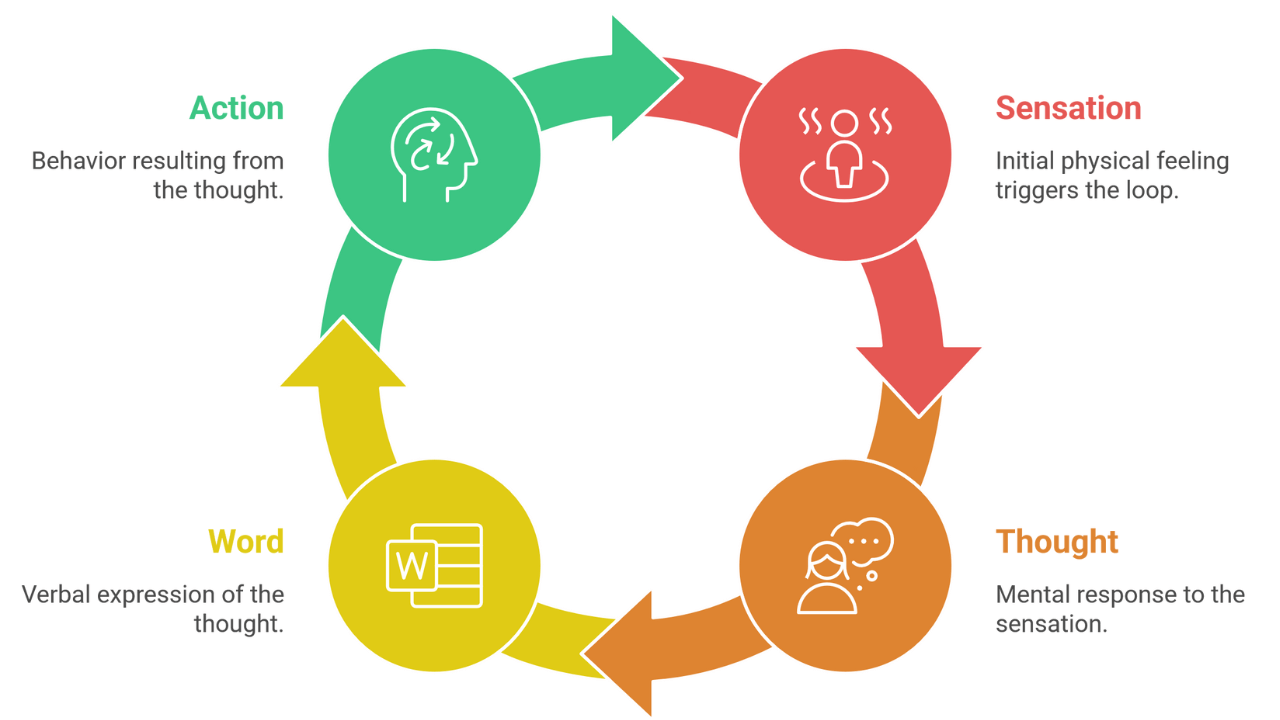
You know something’s off. Your shoulders are constantly tight. Your stomach’s in knots before meetings. You lie in bed completely drained, but still can’t sleep. You keep telling yourself it’s just a rough season, that everyone feels this way, that it’s nothing you can’t handle.
But your body is telling a different story.
In a recent episode of Career Clarity Unlocked, I sat down with Brian Trzaskos, a somatic expert and co-creator of the trauma-sensitive Sensation-Based Motivation Coaching method. We talked about how job stress doesn’t just live in your head. It shows up in your body, quietly building over time until it demands your attention.
This blog breaks down 7 physical symptoms of job-related stress and what you can do about them before they lead to a full-on crash.
🎧 Prefer to listen? How Your Nervous System Affects Your Career
Is Job-Related Stress Making You Sick?
When work feels nonstop, with tight deadlines, back-to-back meetings, and high stakes with no room to breathe, your nervous system shifts into survival mode.
It prioritizes short-term protection over long-term health. Digestion slows. Muscles stay tense. Sleep becomes shallow. Your mind races because your body doesn’t feel safe enough to relax. This is what chronic stress looks like on a physiological level.
When the Body Speaks: Early Warnings of Job-Related Stress
Brian Trzaskos spent years working as a physical therapist. On the surface, everything looked solid: career success, stable income, doing meaningful work. But behind the scenes? He was barely holding it together.
Stress was piling up from every direction: work, home, finances, emotions. Like so many of us, he did what he thought he was supposed to do. He pushed through. He stayed busy. He told himself he could handle it.
Then came the wake-up call. At a routine health fair, his blood pressure clocked in at 179 over 97. He went through test after test. The results? Nothing diagnosable. No clear disease. Just a body that had been running on fumes for far too long.
What he’d been ignoring: acid reflux, insomnia, brain fog, emotional numbness, were not just side effects of adulting. They were early warning signs of chronic stress and system overload.

7 Physical Symptoms of Job-Related Stress
1. Constant Fatigue, Even After Rest
You’re technically sleeping, but your nervous system isn’t. When stress keeps your body in fight-or-flight mode, it blocks access to the deep, restorative sleep your brain needs.
2. Digestive Issues, Acid Reflux, and Gut Discomfort
Chronic stress disrupts your gut’s rhythm. It slows motility, messes with your microbiome, and reduces blood flow to digestion. The result? Bloating, cramping, acid reflux, or bathroom habits that feel all over the place… even if your diet is on point.
3. Sleep Disturbances and Racing Thoughts
You’re exhausted, but your brain is doing laps. That wired, restless feeling? It’s called hyperarousal, when your nervous system stays on high alert even long after the workday ends. Your body’s still scanning for danger when all you want is sleep.
4. Muscle Tension, Jaw Clenching, and Chronic Pain
If your body feels like a clenched fist, this is why. Your muscles are bracing for impact all day. Hello, tension headaches, stiff necks, and a jaw you could crack walnuts with.
5. Emotional Irritability or Detachment
Your brain under stress diverts energy away from your prefrontal cortex (the logical, empathetic part) and hands the reins to your amygdala (the reactive, emotional one). That’s why you either snap at the tiniest thing or feel totally numb. It’s not personal. It’s your nervous system choosing survival over connection.
6. Skin Flares and Immune System Disruptions
Stress cranks up systemic inflammation and lowers immune function. Your body goes into defense mode, and your skin becomes the battleground. Cue: hives, acne, eczema, breakouts, and weird rashes that make no sense.
7. High Blood Pressure and Cardiovascular Stress
Your heart races during meetings. Your chest gets tight when your inbox fills up. This isn’t just “work stress,” it’s your cardiovascular system reacting to constant pressure. Chronic stress keeps your body flooded with cortisol and adrenaline, which can raise blood pressure, strain your heart, and keep your system stuck in overdrive.
Stress and the Physical Body: What Job Burnout Really Looks Like
Burnout isn’t always dramatic. It doesn’t always look like collapsing on the couch or crying in the office bathroom.
Sometimes, it looks like irritability you can’t explain. Or forgetting simple things. Or having zero patience with your partner for asking what’s for dinner.
This isn’t just “being tired.” It’s a dysregulated nervous system that’s been stuck in survival mode for too long.
Your sensory system is the part of your body that constantly scans for safety. It picks up signals like muscle tension, breath, and gut feelings, and tells your brain how to respond. When that input says “not safe,” whether that threat is physical, emotional, or psychological, it sends signals to your brain that say, “Protect me.” Those signals change everything: your posture, your digestion, your tone of voice, your decision-making.
Chronic stress isn’t just a feeling. It’s a full-body pattern. Your biology is literally reshaping how you show up in your life.
As Brian shared on the podcast, your motor expressions (how you move, react, and behave) are a direct reflection of your internal sensory state. That means your burnout isn’t all in your head. It’s in your jaw tension, your shallow breath, your Sunday scaries, and your inability to feel joy at work.
And it’s not your fault. It’s your body doing exactly what it was designed to do: keep you alive in what it perceives as a threatening environment.

Why It’s So Hard to Recognize Job-Related Stress When You’re In It
I see this all the time in my coaching practice. We power through the warning signs. We explain them away. We tell ourselves we just need to push a little harder, get through this week, make it to vacation.
As I said in my conversation with Brian, someone looking from the outside might say, "Whoa, something isn’t right."
But when you're inside of it, it feels normal. Familiar. Sometimes, it even feels like a badge of honor.
Why? Because, as Brian explained, our subconscious belief systems often protect themselves.
If you believe your worth comes from being productive or putting others first, your brain will do everything it can to keep that story intact.
And of course it would. When a belief has kept you safe for years, your mind will filter out anything that threatens it. Even the signs that you’re burning out.
That’s why so many people continue unhealthy behaviors that seem irrational from the outside. Their bodies are protecting an outdated belief.

Your Body Remembers: The Somatic Nature of Burnout
Brian said something on the podcast that really landed: “Beliefs don’t live in your head. They live in your body.”
It’s not just a mindset issue. It’s a full-body loop.
Every belief you hold, whether it’s about being enough, being responsible, being strong, has a somatic pattern that plays out in your nervous system.
It looks like this: Sensation → Thought → Word → Action
Let’s say the belief is “I have to earn my worth.” You feel a pit in your stomach when you try to rest (sensation). That discomfort sparks the thought “I should be doing something.”
You mumble, “I’ll just catch up on a few emails,” and suddenly it’s 8 p.m., you’re reheating coffee you forgot you poured, and dinner is... string cheese and your kid’s leftover mac and cheese.
That’s not a lack of discipline. It’s a well-worn somatic loop.
Here’s where it gets powerful: When you shift the sensation, you interrupt the pattern.
Soothing your body sends a new message to your brain. One that says, You’re safe. And that changes everything, from your thoughts to your choices.
That’s the real power of somatic work.

We Are Taught to Disconnect
This runs deeper than habits. It’s cultural conditioning. Most of us were taught early how to ignore what our bodies were trying to say:
“Don’t cry.” “Push through.” “Be strong.” “Shake it off.”
So we did. We learned to override discomfort with productivity, stuff down emotion with logic, and treat feeling like a weakness.
In a world that praises high pain tolerance and hustle, disconnection starts to feel like strength. But that numbness has a cost.
As I told Brian on the podcast, we live in a culture that rewards burnout and treats rest like failure. But the body never stops telling the truth.
When you stop listening, those quiet whispers eventually turn into full-blown alarms. In Brian’s case, those alarms were chronic pain, acid reflux, insomnia, and high blood pressure.
How many of those alarms are you ignoring right now?
The Power of Listening: How to Heal Job-Related Stress from the Inside Out
What if we took a different approach? What if, instead of pushing those feelings away, you got curious about what your body has been trying to tell you?
On the podcast, Brian shared a powerful framework he and his wife use in their coaching practice. It’s simple, but wildly effective:
Become aware. Decode. Modify. Reframe.
He said we can’t release beliefs we don’t understand. That old story you carry, like “I have to work hard to be worthy,” may have protected you once. Maybe it helped you survive a chaotic childhood. Maybe it earned you praise from emotionally distant parents. But is it still serving you now?
Brian said something that really clicked for me: "Anything you can't be with will control you."
If you're unwilling to feel your anger, fear, disappointment, or fatigue, those emotions will control your decisions.
If you refuse to acknowledge the tension in your chest every Sunday night, you’ll stay in a job that drains you for years.
But if you can feel it. Truly feel it. You can free yourself.

Reclaiming Your Alignment
So how do we start listening to our bodies again?
Brian teaches a method called "cross mapping," where you consciously shift your internal sensory state, without needing to meditate for 30 minutes, contort yourself into a yoga pose, or power pose in a bathroom stall.
It starts with small somatic practices:
- Self-massage
- Mindful movement
- Deep, slow breathing
- Tuning into one part of your body at a time
As your awareness grows, so does your ability to respond differently. Eventually, you can walk into that difficult meeting or ask for that raise without the knot in your stomach dictating your behavior.
Because once you align your sensory state with your actions, you become magnetic. You become whole. You become powerful.
Brian said it best:
"If you are in an aligned state and you walk into the room and ask for something, it's almost impossible to not get it."
You Are Not Starting Over
If this resonates with you, I want you to remember: you’re not alone. You’re not behind. And you are not starting over.
You’re starting from experience. From wisdom. From a new level of awareness.
There is a path forward that honors your body, your emotions, and your purpose. And it doesn’t require you to crash to the ground before you change.
Let your body be your guide.
It already knows the way. It always has.
Don’t Wait Until Job Stress Takes Over Your Body
Brian shared a beautiful quote:
"What you cannot find in your own body, you will never find elsewhere."
If you want peace, love, fulfillment, or purpose, don’t just chase it outside. Feel for it inside. It’s there. And when you find it within, everything outside starts to change too.
Feeling the signs of burnout? You're not alone. Start by listening. Start by feeling. And then take one small, aligned step forward.
FAQs: Job-Related Stress and Physical Burnout
How do I know if it’s burnout or just regular work stress?
Ask yourself this: Does rest actually help? If a weekend off or a good night’s sleep makes you feel better, it’s likely stress. If you’re still exhausted after rest, detached from things you used to care about, or having physical symptoms that make no sense, it’s not just a busy week. It’s your body waving a red flag.
What can I do to manage job-related stress before it escalates?
Interrupt the autopilot. Most people wait until the crash to make a change, but your nervous system is giving you clues long before that. Start by noticing how your body reacts under pressure, do you clench, shut down, overwork? Then choose one small, sensory shift to create safety inside. A slow breath. A stretch. A moment of stillness. That’s where the reset begins.
Why don’t I realize I’m burned out until it’s bad?
Because burnout often looks functional. You’re still getting things done, still showing up — so it doesn’t register as a crisis. But underneath, your body’s paying the bill. Burnout wears the mask of productivity... until it doesn’t.
About Career Coach and Author
Theresa White, Career Clarity Expert, 5x Certified Career Coach, and the Founder of Career Bloom, is known for her expertise in guiding people to get unstuck and find the direction they need to move forward in their careers—fast. In a time when so many people are re-evaluating their work, Theresa offers actionable insights that empower clients to identify their true strengths and pursue work that genuinely aligns with their goals.
Theresa’s clients often call her sessions “epiphanies” and “transformational.” She brings immediate clarity to career goals, helping people unlock a deep understanding of what makes work fulfilling for them. Past participants consistently describe her approach as “spot on” and an “answer to questions they’d been asking for weeks.”
Theresa’s approach is empathetic yet practical, and she’s known for empowering clients with a clear direction in as little as 30 days, guaranteeing results.
Connect with Theresa on LinkedIn, listen to the Career Clarity Unlocked Podcast, or schedule your free 30-minute career clarity consultation.

What Other Job Seekers Are Reading
- What to do when you're feeling stuck in career
- How to Find Your Perfect Career
- 8 progressive companies to work for
- 7 Message Templates to Reach Out to Recruiters
- How to Use AI to Find a Job in 2025: Why Soft Skills Still Matter
- Free Job Search Tracker
- Get Career Clarity In Just 30 Days!
- Take this 60 second quiz to see if a free career clarity call with my team is your next best step.
Subscribe now to never miss the latest blog!
Every Thursday, we cover an important topic, actionable advice, and inspiring content to help you find work that makes you feel like *pinch me* I'm getting paid to do this???
We hate SPAM. We will never sell your information, for any reason.




